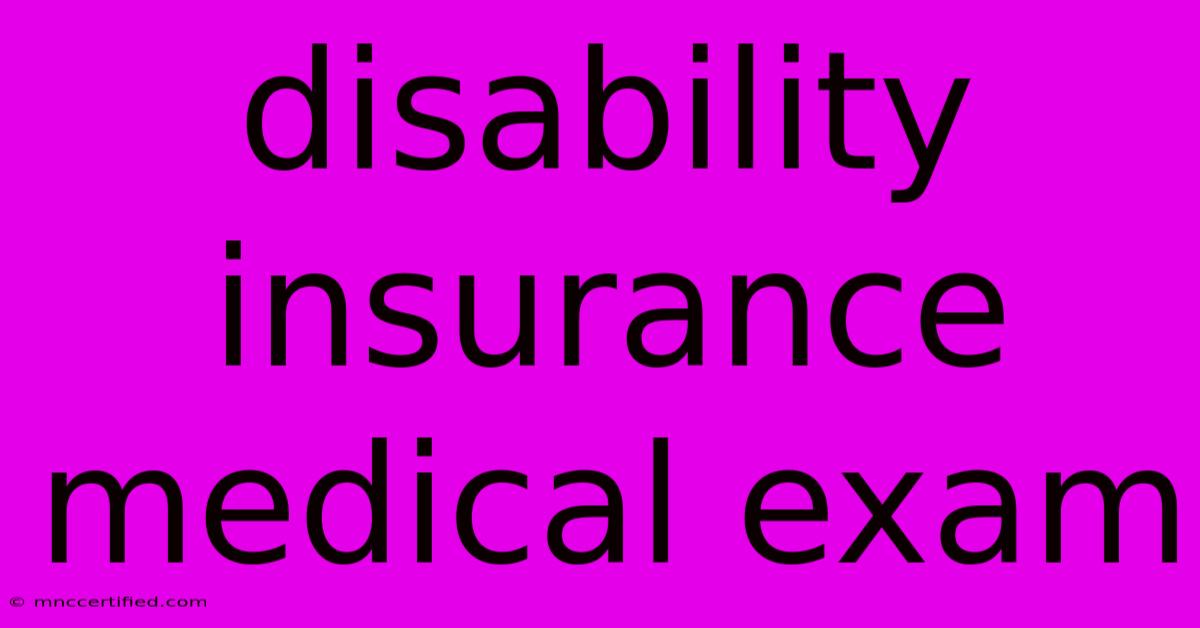Disability Insurance Medical Exam

Table of Contents
Disability Insurance Medical Exam: What to Expect
Applying for disability insurance can feel overwhelming, and the medical exam is often a significant source of anxiety. Understanding what to expect during this process can significantly reduce stress and improve your chances of a successful claim. This comprehensive guide covers everything you need to know about disability insurance medical exams, from preparation to follow-up.
What is a Disability Insurance Medical Exam?
A disability insurance medical exam, also known as an independent medical examination (IME) or an independent medical evaluation (IME), is a physical examination conducted by a physician chosen by your insurance company. This exam isn't a substitute for your own doctor's records; rather, it serves as an independent assessment of your medical condition to verify the information provided in your application. The insurer uses this exam to assess the severity of your disability and determine your eligibility for benefits. The goal is to objectively evaluate your functional limitations and capabilities.
Why is a Medical Exam Necessary?
Insurance companies require medical exams to mitigate risk and prevent fraudulent claims. They need objective, verifiable evidence to support the disability claims they receive. A medical exam allows the insurer to:
- Verify the nature and severity of your condition: Your own doctor's notes and records are crucial, but an independent assessment provides an additional layer of verification.
- Assess your functional limitations: The exam evaluates your physical and cognitive abilities to determine how your condition impacts your ability to perform your job.
- Determine your prognosis: The doctor will assess the likelihood of your condition improving or worsening, which helps predict the long-term need for benefits.
- Identify any pre-existing conditions: Pre-existing conditions might affect your eligibility or the amount of benefits you receive.
What to Expect During the Exam
The specific aspects of your exam will depend on your claimed disability. However, generally, you can anticipate:
- A thorough review of your medical history: The physician will ask detailed questions about your medical history, current symptoms, and treatment. Be prepared to provide accurate and complete information.
- A physical examination: This will likely include tests relevant to your claimed disability. For example, someone claiming a back injury might expect range-of-motion tests, while someone with a mental health condition might undergo a cognitive assessment.
- Diagnostic testing (potentially): Depending on your condition, the physician may order additional tests like blood work, X-rays, or other imaging studies.
- Functional capacity evaluation (FCE): In some cases, an FCE might be recommended. This comprehensive evaluation assesses your ability to perform various physical tasks and activities.
Preparing for Your Exam:
- Gather your medical records: Bring copies of all relevant medical records, including doctor's notes, test results, and hospital discharge summaries.
- Prepare a list of questions: Write down any questions you have for the physician. This helps ensure you understand the process and the results.
- Dress comfortably: Wear clothing that allows for easy movement and examination.
- Arrive on time: Punctuality demonstrates your seriousness and respect for the process.
- Be honest and forthcoming: Provide accurate and complete information throughout the exam.
After the Medical Exam: What Happens Next?
Following your exam, the physician will prepare a comprehensive report summarizing their findings. This report will be sent to your insurance company, who will then review it along with your application and other supporting documentation. The review process can take several weeks or even months. You'll receive notification of the insurance company's decision regarding your claim.
Finding a Doctor for an Independent Medical Examination (IME):
You generally don't get to choose the doctor conducting the IME. The insurance company selects a physician from their panel of approved medical professionals. However, it's crucial to ask questions about their qualifications and experience relating to your specific condition. Understanding the process and being prepared can significantly ease the anxiety associated with this crucial step in the disability insurance claim process.
Legal Assistance and Advocacy
If you're facing challenges with your disability insurance claim, consulting with a disability lawyer or advocate is highly recommended. They can help you navigate the complexities of the process and ensure your rights are protected.
This article provides general information and should not be considered legal or medical advice. Always consult with the appropriate professionals for personalized guidance. Remember, understanding the disability insurance medical exam process is key to a successful claim. By being prepared and informed, you can significantly increase your chances of receiving the benefits you deserve.

Thank you for visiting our website wich cover about Disability Insurance Medical Exam. We hope the information provided has been useful to you. Feel free to contact us if you have any questions or need further assistance. See you next time and dont miss to bookmark.
Featured Posts
-
Sidemen Charity Match Wembley Sellout
Nov 19, 2024
-
Jefferson Standard Life Insurance
Nov 19, 2024
-
Texans Roof Tweet Post Cowboys Win
Nov 19, 2024
-
Dominguez Insurance Fort Smith Ar
Nov 19, 2024
-
Family Security Insurance Company
Nov 19, 2024